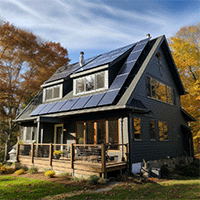Cost of solar panels in Massachusetts
How much is it to go solar in 2023?

The average cost to install solar panels is $19,110 in Massachusetts before the federal solar investment tax credit (ITC). The price drops to $13,377 after factoring in the ITC.
Going solar in the Bay State is about 20% cheaper than the national average. The out-of-pocket investment is lower than in other states, even though the cost per watt is higher. (The typical system is on the smaller side.) Massachusetts also offers many solar incentives that make paying for a new solar energy system financially easier.
Key insights
- The average cost per watt is $2.94 in Massachusetts.
- The average payback period in Massachusetts is eight years if you pay for your system in full upfront.
- Massachusetts residents who go solar receive an estimated average net savings of $33,013 over 25 years.
How much do solar panels cost in Massachusetts?
Installing residential solar panels can cost between $10,000 to $30,000 or more, though individual costs vary significantly based on your system’s power output, how much sun your home gets and other factors. In Massachusetts, the typical system size is 6.5 kilowatts (kW).
On the higher end, Sarin in Leominster installed a large system (36 panels, two solar batteries and two inverters) in 2021. Sarin was quoted $39,100, but the price came down to $11,300 after tax credits and incentives. Nathan in Pittsfield told us he paid $50,000 for a 17-kW system.
Average cost by system size in Massachusetts
| 4 kW | 5 kW | 6 kW | 7 kW | 8 kW | 9 kW | 10 kW | |
|---|---|---|---|---|---|---|---|
| After federal tax credits | $8,232 | $10,290 | $12,348 | $14,406 | $16,464 | $18,522 | $20,580 |
| Before federal tax credits | $11,760 | $14,700 | $17,640 | $20,580 | $23,520 | $26,460 | $29,400 |
| Average home size the system can support | 1,200 sq. ft. | 1,400 sq. ft. | 1,600 sq. ft. | 1,800 sq. ft. | 2,000 sq. ft. | 2,200 sq. ft. | 2,400 sq. ft. |
Are solar panels worth it in Massachusetts?
We’ve talked to dozens of solar customers in Massachusetts over the last couple of years. The majority seem happy or satisfied with their decision to install a solar energy system.
Massachusetts receives an average of 2.5 to 3.5 hours of peak sunlight a day.
Many happy customers we’ve talked to highlight the financial benefits. For example, Earl in Quincy said his monthly bills went from $300 to $50 or $60. “I'm donating more to the grid than I use. I outlaid $17,000 in cash and I'll become whole again in six and a half years,” he said. “After that, I will have free electricity for the next 19 years. It’s awesome.”
Going solar can be especially helpful if you also have an electric car, like Ronald in Groton: “I’ve driven a Chevy Bolt EV since 2019, charging from my roof solar, essentially costing me nothing and saving 2 tons of CO2 by not using fossil fuel.”
I will have free electricity for the next 19 years. It’s awesome.”
It doesn’t work out for everyone the same way. “The return on investment wasn't anywhere near what we thought it would be,” Marc in Holliston told us. “But I know that our roofline has some weirdness. It's not a straight roofline. So it may not be ideal.”
If you live in an area that receives severe winter storms, it may also be worth purchasing batteries to receive power during outages.
Kevin in Lenox said he “got some incentives back for shared connections and net metering. We've had power outages and the battery backups have been great, especially in the winter time. We had one very long power outage and the batteries kept us going.”
» MORE: Are solar panels worth it?
Cost factors of going solar in Massachusetts
The actual price you pay for solar panels can vary significantly. The cost hinges on multiple factors, including the size of your solar energy system, the quality of the panels you choose and your roof’s condition.
Equipment costs
There are four major equipment costs when installing a solar energy system. A large portion of the cost of your solar energy system is the price of solar panels. A panel’s price varies depending on the solar panel's efficiency and the size and weight of your panels.
Getting a monitoring system can also add $80 to $400 if your solar installer does not provide one with the system. Solar inverters, which make the energy coming from your panels usable for your home’s electrical, can cost $1,000 to $3,000. The final cost is optional: Installing solar batteries can add another $7,000 to $18,000 to your bill.
» COMPARE: Most efficient solar panels
Condition of your roof
Solar panels should last 25 to 30 years. If your roof isn’t in tiptop shape when you install your panels, it may not last as long. Be sure to get your roof inspected and, if necessary, repaired or replaced before going solar. That way, you won’t have the extra cost of removing and reinstalling your panels when your roof needs fixing down the line.
For example, Patricia in Dartmouth installed panels in 2015. “We knew we would need a new roof within a few years and were told it was a single charge of $1,000 to have them removed and reinstalled,” she said. Now, the cost is $170 per panel, totaling nearly $5,000 for the entire system.
How you pay
If you can’t pay up, Massachusetts offers residents a wide range of solar loans to finance solar panels and appliances like water heaters. You also have the option of leasing solar equipment or getting a PPA (power purchase agreement).
“I'm not a big fan of buying a product that you can never really know until you use it,” said David in Brockton, who leased his solar power equipment. “It's not like you're gonna go out and buy a bunch of solar panels for your house then six months or a year later, go, ‘I wish I hadn't bought them. I wish I had bought something else.’ If you're leasing them, they're not yours and you don't have to worry about it. If they don't work, you don't have to fix them.”
If you're contemplating a solar loan, a lease or a power purchase agreement (PPA), it's essential to find out about the following:
- Is there an initial down payment required?
- What is the monthly payment amount?
- When and by how much will the monthly payments increase, if at all?
» SOLAR PANELS: Lease vs. buy
Local permits and fees
Most states require permits and fees for installing solar, but some offer permit reductions as an incentive to install solar. In Massachusetts, unfortunately, there aren’t any permit or fee discounts or waivers.
Solar incentives, tax credits and rebates in Massachusetts
The federal solar investment tax credit (ITC) is the biggest national incentive available for people going solar in Massachusetts. With the ITC, if you install a residential solar panel system before the end of 2032, you can deduct 30% of the system's total cost from your federal taxes. The sooner you take advantage, the better: The credit drops to 26% in 2033 and 22% in 2034.
The average ITC value in Massachusetts is $5,733 in 2023.
Massachusetts also offers tax exemptions, tax credits, rebates and loan programs to residents to incentivize going solar. Though some are statewide, many of these are offered locally through area electric companies and town governments. One of the most lucrative incentives is the 100% tax property tax exemption.
» EXPLORE: Massachusetts solar incentives
Compare solar installation companies in Massachusetts
Compare popular solar companies available in Massachusetts below. Read our guide about finding the best solar companies for more.
| SunPower | ShopSolar | Palmetto Solar | Sunrun | ||||
|---|---|---|---|---|---|---|---|
| Primary | SunPower | Read reviews | Customer Ratings 4.3 | Free quote | Payment options
Cash, loan, lease
| Warranty
10 to 25 years
| |
| Primary |  | ShopSolar | Read reviews | Customer Ratings 4.7 | Free quote | Payment options
Cash, loan
| Warranty
Varies
|
| Primary | Palmetto Solar | Read reviews | Customer Ratings 3.7 | Free quote | Payment options
Cash, lease, loan or PPA
| Warranty
25 years (product and performance)
| |
| Primary |  | Sunrun | Read reviews | Customer Ratings 4.1 | Free quote | Payment options
Cash, loan, lease
| Warranty
25 years
|
FAQ
How are solar costs trending in Massachusetts?
The cost to go solar in Massachusetts has fallen 43% over the last 10 years, according to the Solar Energy Industries Association.
How much can I save with solar panels?
When you pay in full upfront, the average 25-year savings with solar is $33,013 in Massachusetts. The state only receives an average of 2.5 to 3.5 peak sun hours daily, so you may not be able to produce all your needed power through solar. The good news is that Massachusettsans can expect to offset their electricity bills by 80% to 108%.
Anecdotally, Cori in East Longmeadow said they save $40 per month, and Thu in Methuen saves around $60. Rosineia in Hyannis is saving “over $1,000 annually.”
How does net metering work in Massachusetts?
Net metering is selling surplus electricity generated by your solar panels back to the power grid. Under the state's net metering regulations, new solar customers receive bill credits equal to 60% of their net excess kilowatt-hours.
How many solar panels do I need for my house?
The number of solar panels you need depends on how much electricity your household uses. In Massachusetts, the average monthly energy consumption is around 596 kilowatt-hours, according to the Energy Information Administration.
For example, Brik in Bedford told us, “I have like 22 panels and we only get no more than 30-40 watts (per day). But that was enough for me.”
Can I get free solar panels in Massachusetts?
No, there are no programs in Massachusetts that offer free solar panels. You can lease or enter a PPA with little to no upfront cost, though.
» FREE SOLAR PANELS: Are they really free?
Bottom line
Before tax credits, residential solar energy systems in Massachusetts tend to average around $19,110, with a typical system size of 6.5 kilowatts (kW). The state offers various incentives to get residents to go solar, including a range of tax credits, rebates and loan programs.
If you need help paying for your system, a solar loan, lease or power purchase agreement can make a solar energy system more within your reach.
» STILL NOT SURE? Solar energy pros and cons
Solar costs: Massachusetts vs. nearby states
| Typical system size | Upfront cost* | ITC value (30%) | Average cost per watt | Payback period** | Estimated net savings | |
|---|---|---|---|---|---|---|
| Massachusetts | 6.5 kW | $19,110 | $5,733 | $2.94 | 8 years | $33,013 |
| Connecticut | 7.5 kW | $21,000 | $6,300 | $2.80 | 8 years | $42,705 |
| Vermont | 6 kW | $17,220 | $5,166 | $2.87 | 9 years | $26,468 |
| Rhode Island | 6 kW | $17,040 | $5,112 | $2.84 | 8 years | $34,519 |
| New York | 6.5 kW | $19,183 | $5,760 | $2.94 | 10 years | $24,387 |
| New Hampshire | 6.5 kW | $18,916 | $5,675 | $2.91 | 9 years | $28,409 |
Article sources
- DSIRE, “ Massachusetts Solar Programs .” Accessed Sept. 13, 2023.
- Commonwealth of Massachusetts, “ Solar Information & Programs .” Accessed Sept. 13, 2023.
- EcoWatch, “ Solar Panel Cost in Massachusetts .” Accessed Sept. 13, 2023.
- EnergySage, “ Massachusetts solar panels: local pricing and installation data .” Accessed Sept. 13, 2023.
- Office of Energy Efficiency & Renewable Energy, “ Homeowner’s Guide to the Federal Tax Credit for Solar Photovoltaics .” Accessed Sept. 13, 2023.
- Solar Energy Industries Association, “ Massachusetts Solar .” Accessed Sept. 13, 2023.
- U.S. Energy Information Administration, “ Electricity .” Accessed Sept. 13, 2023.
You’re signed up
We’ll start sending you the news you need delivered straight to you. We value your privacy. Unsubscribe easily.
